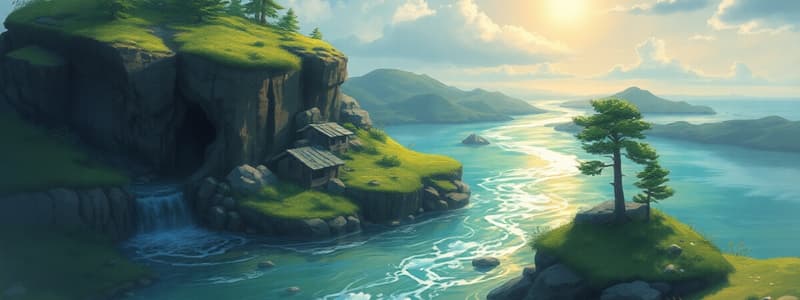Podcast
Questions and Answers
Scientists can predict future alterations in the Earth's water cycle.
Scientists can predict future alterations in the Earth's water cycle.
True (A)
What tools do meteorologists use to measure the amount of annual rainfall?
What tools do meteorologists use to measure the amount of annual rainfall?
Rain gauges and other meteorological instruments.
Which of the following is NOT a process involved in the water cycle?
Which of the following is NOT a process involved in the water cycle?
- Photosynthesis (correct)
- Condensation
- Precipitation
- Evaporation
Water changes to vapor during __________.
Water changes to vapor during __________.
Match the following stages of the water cycle with their descriptions:
Match the following stages of the water cycle with their descriptions:
What physiological adaptation helps sharks maintain water balance in high salinity environments?
What physiological adaptation helps sharks maintain water balance in high salinity environments?
Fish in freshwater excrete concentrated urine to retain water.
Fish in freshwater excrete concentrated urine to retain water.
Where are the kidneys located in fish?
Where are the kidneys located in fish?
Sharks control their water and salt balance by regulating the levels of __________ in their blood.
Sharks control their water and salt balance by regulating the levels of __________ in their blood.
Match the following fish features with their descriptions:
Match the following fish features with their descriptions:
Flashcards are hidden until you start studying
Study Notes
Water Cycle
- Water exists in three states: solid (ice), liquid (water), and gas (water vapor)
- The water cycle describes the continuous movement of water on, above, and below Earth's Surface
- The water cycle is an almost closed system
- The water cycle is crucial for Earth's physical, chemical, and biological processes
Stages of the Water Cycle
- Evaporation: liquid water shifts into vapor, contributing to cloud formation
- Condensation: water vapour cools and transforms back into liquid water
- Precipitation: water falls back to Earth's surface as rain or snow
- Transpiration: plants release water vapor into the atmosphere
- Surface Runoff: water flows over land
- Infiltration: water soaks into the ground
- Groundwater Flow: water moves beneath the surface, typically towards oceans
Water Cycle Impacts
- Water vapor in clouds can react with airborne pollutants, generating acidic rain
- Acid rain can erode rocks
Tools for Measuring Rainfall
- Meteorologists use rain gauges to measure rainfall
Predicting Future Changes
- Scientists can predict future alterations in the water cycle
Fish and Osmoregulation
- Fish eliminate excess water through kidneys, producing dilute urine.
- Fish living in saltwater swallow large amounts of seawater to compensate for water loss.
- Saltwater fish excrete excess salts through kidneys and specialized cells in their gills.
Sharks and Salinity
- Sharks maintain water and salt balance by controlling urea in their blood.
- Urea is a nitrogenous waste product normally excreted in urine.
- Sharks have a high concentration of urea in their blood, matching the osmotic pressure of seawater.
- This reduces water loss from their bodies.
Anatomy of a Fish
- The kidneys are located in the abdominal cavity, on either side of the spine.
- Fish possess a complex internal structure with organs like the gallbladder, gills, heart, liver, stomach, intestines, and reproductive organs.
- They also have specialized structures for movement and buoyancy, including a swim bladder, fins, and a lateral line.
Studying That Suits You
Use AI to generate personalized quizzes and flashcards to suit your learning preferences.




